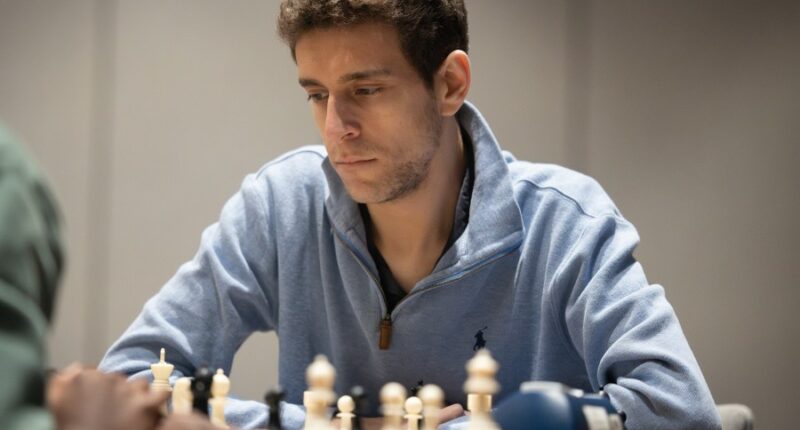Share this @internewscast.com

Daniel Naroditsky, a prominent figure in competitive chess who rose to fame during the COVID-19 pandemic, passed away on Monday at the age of 29. He leaves behind a profound impact on the game, particularly in its transition to the digital age.
An American grandmaster, Naroditsky clinched numerous titles and garnered a massive following on platforms like YouTube and Twitch, where he captivated audiences by streaming matches and breaking down strategies in real time. However, he also faced challenges within the digital sphere he helped to grow.
During the pandemic, fast-paced online chess games surged in popularity, leading to a community often marred by cheating accusations as players accessed advanced computer programs for unfair advantages.
Naroditsky’s sudden passing has cast a light on the troubling aspects of the game, with fellow professionals noting the undue criticism and hostility he faced in his final months.
The cause of his death remains undisclosed.
Legacy of integrity
He was plagued by baseless cheating allegations from Russian grandmaster and former World Chess Champion Vladimir Kramnik, someone Naroditsky once admired as a young chess enthusiast.
The California-born pro had denied the claims as he excelled at blitz and bullet chess, where players have mere minutes to finish intense matches. He was vocal about how the allegations took a toll on him.
“Ever since the Kramnik stuff, I feel like if I start doing well, people assume the worst of intentions,” Naroditsky said Saturday in the last livestream he filmed before his death. “The issue is just the lingering effect of it.”
He ruminated about his legacy and hoped other top players would trust that he played with integrity.
Grandmasters and other chess pros from around the world have applauded Naroditsky as an honorable ambassador of the game who used his online platform to make chess accessible to everyone. His family said in a statement that they hope he will be remembered for the joy and inspiration he brought people every day.
Naroditsky became a grandmaster, the highest title in chess aside from World Chess Champion, at the age of 18. He was consistently ranked in the top 200 worldwide for traditional chess, and he won the U.S. National Blitz Championship in August. He spent much of his time training young players in Charlotte, North Carolina.
“Daniel was an incredible teacher and explainer of chess and concepts and ideas,” said Daniel Weissbarth, co-owner of Silver Knights Chess Academy in Fairfax, Virginia.
Arkady Dvorkovich, president of the International Chess Federation, said the organization will establish a prize in memory of Naroditsky and his contributions to chess. Dvorkovich described the young grandmaster as brilliant, kind and a truly good person.
Blame game
Many pros this week called for an end to the constant finger-pointing that seemed to follow players like Naroditsky who thrived in fast-paced play.
Kenneth Regan, a chess international master and computer science professor at the University at Buffalo, said the opportunity to cheat has exploded as the cerebral sport has shifted online. There are ways to police the game online, but Regan said they are intrusive.
“The rate of cheating online is 100 to 200 times higher than the rate over the board,” Regan said. “From my point of view, there are five to 10 cases per year over the board.”
The popular internet chess server Chess.com shut down Kramnik’s blog on the site in 2023, saying he had used it to spread baseless cheating allegations about “many dozens of players.” At the time, the platform warned of “Kramnik’s escalating attacks” against some of the most respected members of the chess community and some promising young talents.
The speedy style of play popularized in chess’ digital arena is somewhat reliant on the honor system.
Top talents analyze the board so quickly and move with such precision that cheating allegations have become common. Bullet chess is so fast, Regan said, that it’s essentially “playing chess entirely with your gut.”
Nurturing young talent
Last week, Naroditsky posted a video on his popular Speedrun chess series on YouTube, telling viewers he was “back, better than ever” after a short “creative break.” His videos, in which he gave tips and discussed strategy, were great tools for chess players of various abilities, said Benjamin Balas, professor of psychology at North Dakota State.
“He would tell you ‘This is the kind of mistake you’re going to see at this level,’ and he would make mistakes, too, and talk to you how to manage them,” Balas said.
Other grandmasters such as Hikaru Nakamura and five-time World Chess Champion Magnus Carlsen are using social media to take chess to a wider audience, increasing its popularity around the world.
“People, they see Daniel or other streamers and they start to play online chess,” said John Hartmann, editor of Chess Life magazine. “The streaming personalities, they lead people into the chess world.”
Carlsen credited Naroditsky for his work in the streaming space, saying he was universally loved and “such a resource to the chess community.”

















